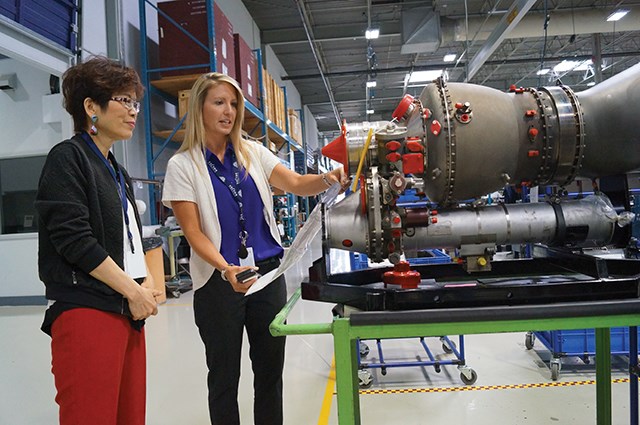B.C.’s Minister of International Trade and MLA for Richmond Centre, Teresa Wat, toured several aerospace companies last week in a bid to grasp a greater understanding of what she says is a $1.2 billion industry in the province.
She told reporters the government recently invested $5 million in the industry over the next five years in order to give it a boost as new rounds of federal grants will be dispersed to provinces.
“We are well known for our maintenance, repair and overhaul (skills),” said Wat.
On her agenda was a visit to Vector Aerospace on Sea Island, a company that focuses on the maintenance of helicopter and fixed wing engines and components. Notably, it has a number of contracts with the Department of National Defence and fixes components on the CH-124 Sea King helicopters. In the years to come Vector will also be working on Canada’s new Cyclone helicopters as the military makes its transition.
Wat toured Vector’s Richmond facility, which employs about 300 people (about half of Vector’s entire workforce of over 2,700 employees is based in Canada).
At issue for Wat is how to remain competitive with emerging aerospace markets, particularly from the BRIC (Brazil, Russia, India and China) countries.
Vector spokesperson Chelsie Aichelberger said her company is seeing steady growth and is responding to emerging markets by “establishing a footprint with fixed wing and rotor wing maintenance repair and overhaul shops in Brazil and Singapore. …scheduled to open in late 2014.”
Vector not only fixes local aircraft but also engines and components from all over the world.
“Most helicopter and fixed wing engines and components are transportable and easy to ship around the world,” said Aichelberger.
A typical helicopter, such as those flown by Helijet, will typically need maintenance every 100 hours, according to a Vector engineer.
When asked how such companies can stay competitive Aichelberger noted companies like itself that are based in B.C. rely on credibility and quality.
Wat said she had learned from local aerospace experts that labour laws and unions are more flexible in Europe as opposed to B.C.
She said the CEO at MTU Maintenance Canada, just down the road from Vector, told her that labour costs in B.C. are some of the highest.
Such companies, based out of Richmond, provide many jobs to local residents, many of whom are graduates of Sea Island’s BCIT Aerospace Technology Campus.
@WestcoastWood



